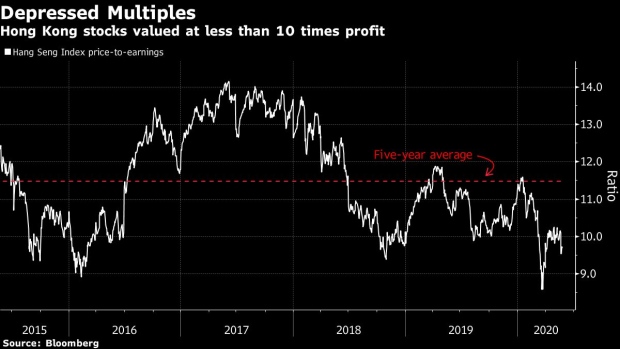May 28, 2020
Hong Kong Stock Slump Deepens on New Risk of U.S. Sanctions
, Bloomberg News

(Bloomberg) -- Hong Kong stocks fell toward a two-month low as the likelihood of sanctions being imposed by the U.S. increased after the Trump administration said it could no longer certify the former colony’s political autonomy from China.
The Hang Seng Index was down 1.8% as of 1:05 p.m. local time, poised for its lowest close since March 24. Local real estate firms and Chinese health-care companies were among the biggest losers. The decline was among the biggest in Asia. The offshore yuan traded near a record low.
The Hang Seng suffered its worst single-day loss in five years last week after the Chinese Communist Party shocked investors by unveiling its intention to stifle dissent in Hong Kong. Beijing’s move to impose a national security law has escalated tensions between the world’s two largest economies, with all eyes now on what the U.S. will do next.
“Sino-U.S. relations will likely remain difficult before the U.S. presidential election and Hong Kong will be caught in the middle of that spat, so it’s going to be a bumpy road ahead,” said Alvin Cheung, associate director with Prudential Brokerage Ltd. in Hong Kong. “Investors should prepare themselves for huge volatility.”
Secretary of State Michael Pompeo announced the decision Wednesday in a statement, saying: “No reasonable person can assert today that Hong Kong maintains a high degree of autonomy from China, given facts on the ground.”
Pompeo’s decision opens the door for a range of options, from visa restrictions and asset freezes for top officials to possibly imposing tariffs on goods coming from the former British colony. The Chinese embassy in the U.S. said it would take “necessary countermeasures” against what it called “foreign meddling in Hong Kong affairs.”
Real estate firms extended their recent declines. New World Development Co. slipped 4% and Swire Pacific Ltd. retreated 4.5% to hit its lowest since 2009. CSPC Pharmaceutical Group Ltd. slumped 12% to lead declines on the Hang Seng Index.
The Hong Kong dollar strengthened slightly. China’s offshore yuan weakened overnight to match its record low of 7.1965 per dollar, set in September last year, and was last at 7.1853.
Friday’s slump left the Hang Seng trading at 9.5 times reported earnings, about half the multiple of MSCI Inc.’s global index and the biggest discount since 2016. Few benchmarks trade at single-digit valuations; those that do are mostly frontier markets such as Colombia, Argentina and Sri Lanka.
Mainland money has been supporting the city’s shares, in an echo of state-directed efforts to shore up markets across the border during politically sensitive times. Eligible investors, which range from brokers to insurers and wealthy individuals, have pumped $35.4 billion in this year via cross-border exchange links as of Wednesday, the most for the period in data going back to 2017. Buying accelerated as the Hang Seng Index crashed.
Suppliers to Huawei Technologies Co. fell after a Canadian judge ruled proceedings of Huawei chief financial officer Meng Wanzhou’s U.S. extradition case would continue. AAC Technologies Holdings Inc. lost 5.1% and Sunny Optical Technology Group Co. dropped 3.1%.
©2020 Bloomberg L.P.





